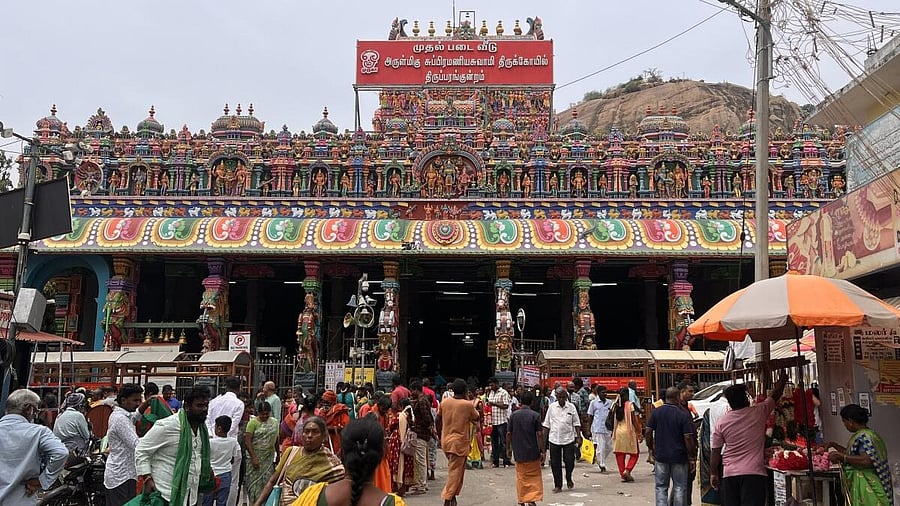
Thiruparankundram has been a haven of religious coexistence and communal harmony for centuries.
Credit: DH photo
“Thiruparankundram will be the next Ayodhya,” declared H Raja, a senior Tamil Nadu BJP leader, in February 2025. He made this statement as tensions flared in Thiruparankundram, the first of the six abodes of Lord Murugan, over demands to rename the hillock, which is also home to a dargah, as Sikkandar Malai.
The swift intervention of the Madurai Bench of the Madras High Court helped cool tempers. Four months later, in June, Union Home Minister Amit Shah visited this ancient temple city.
During his visit, he accused the DMK government of supporting the renaming of the hillock and encouraged Hindu devotees to participate in the June 22 Murugan conference, which advocated for Hindu consolidation in favour of the BJP.
The statements by Raja and Shah, though separated by months, are part of ongoing efforts by the BJP to invoke Lord Murugan -- one of the most revered deities, especially among backward communities and transcending caste lines -- as its poster boy in Tamil Nadu, where the party is yet to gain a significant foothold.
Despite the attempt by both sides – the BJP alleges that the issue blew up after Ramanathapuram Lok Sabha MP Nawaz Kani lead a group to consume meat at the hills – the villagers continue to live in harmony and say no force can break the bond between the two communities, who have lived as “relatives.”
Both Hindus and Muslims point to “outsiders” from both communities as attempting to create tensions for political gain. The government recently argued before the High Court that religious sacrifices are allowed in temples, which was one of the issues raised by the BJP and right-wing groups.
Thiruparankundram hill has been a haven of religious coexistence and communal harmony for centuries, hosting the Subramaniya Swamy temple, Kasi Viswanathan temple, and Sikkander Badusha dargah.
While the dargah is the most recent religious structure, dating to the 17th century, there has never been major religious conflict in the village.
An ownership dispute that arose about a century ago was settled in 1923 by a Subordinate Judge of Madura, who ruled that the whole hill, except “certain cultivated and assessed lands and the site of the mosque,” belonged to the Murugan Temple.
Edakanathan (65), who runs a stall overlooking the Murugan Temple, told DH that he moved to the village at age 12 and has never witnessed a conflict over religious identity.
“They are like our blood relatives. We have lived together for centuries and will continue to do so. To this day, Muslim brethren buy sandalwood powder from me before climbing the hillock to visit the dargah. That’s how united we are. Whatever happened earlier this year is just politics—it has nothing to do with us,” he said.
Senthil (39), who works at a hotel, recalls being taken to the dargah by his Muslim friends when he was sick, hoping for a cure.
“I came here 12 years ago and have visited the dargah multiple times, while my friends have come to the temple. We have no differences, but it is true that outsiders are trying to create trouble. Thiruparankundram will never become another Ayodhya. There is no dispute here,” he said.
He added that the Ramanathapuram MP’s visit contributed to the flare-up and asserted that no animal sacrifice should occur atop the hill since it houses a shrine for Lord Shiva. “We in Madurai offer animal sacrifices to other deities, but not to Lord Shiva. So, animal sacrifice shouldn’t take place here,” he explained.
Syed Ibrahim, a cloth merchant, echoed Senthil’s views, noting the close relationships among residents. “We give biryani to our Hindu brothers during Ramzan; they give us sweets during their festivals,” he said.
M Arif Khan, Secretary of the Sikkander Badusha dargah, blamed the Madurai District Administration and police for the flare-up earlier this year.
“There is no problem among the people here. The courts clarified the ownership issue long ago, so why create a problem now? If this is purely for political gain, we won’t give in to it. We’re clear that there will be no split between us on religious lines,” he said.
Regarding reports of people consuming meat on the hillock in December last year, Khan explained that even the Madurai Bench only differed on the issue of animal sacrifice at the hills, not on meat consumption.
“The police should follow the law, not create unnecessary disturbances for pilgrims who climb about 1,000 steps to reach the dargah,” Khan added.